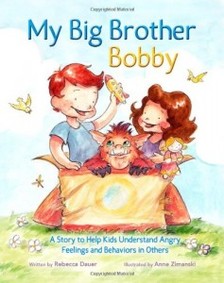 Being angry, seeing red, meltdowns, and freaking out are just a few words we have to describe what happens when a person loses control of themselves. My Big Brother Bobby: Understand Angry Feelings and Behaviors of Others by Rebecca Dauer helps siblings, classmates, friends and other family members to understand children who struggle with emotional and behavioral problems. For some of our children their lives or their environment become overwhelming. They just can’t deal with all the sensory bombardments and may act out, withdraw, become emotional, run, etc. My Big Brother Bobby is a fun, imaginative story that educates children on the importance of understanding and coping with anger in others in a warm and easy to understand way. It isn’t your typical children’s book. It is more of a communication bridge between parents, social workers, OTs, psychologists and children who are dealing with emotional issues, specifically those living with siblings with angry outbursts. Rebecca’s blog is a wealth of information about siblings of children with special needs. We thank Rebecca Dauer for her guest post introducing her book and agreeing to take part in our Author Interview Series. Lorna: Congratulations of your book, My Big Brother Bobby: Understand Angry Feelings and Behaviors of Others. What is the story behind this book? Why did you think a book on this topic was needed? <<Rebecca Dauer: The story behind the book is loosely based on stories from friends and family as well as my personal experiences. When I was younger, there was very little materials or outlets for siblings and I felt the need to change it. After doing research for the book, I found an immense amount of support from the sibling community. Everyone can relate to this book, whether it is a parent, sibling, cousin or friend who has a monster in their belly, it is hard on everyone and especially for young children. I wanted to bring to light the real struggles and emotions that children have and to bridge the communication gap for parents and health professionals.>> Lorna: You and the illustrator, Annie Zimanski, make a very good team. Annie’s illustrations bring your story to life! Usually how does the author of a picture book work with the illustrator? It seems to me there is a lot of communication that most go on to finish with a beautiful book like My Big Brother Bobby. <<Rebecca Dauer: Great question! I found Annie on elance.com after searching through several children’s book illustrators. I loved her work and she related well to the book. The first step in the process is to understand the story and then, creating the characters in the right medium. For example, they could look digital, acrylic or have a soft pastel look. Each change of color, character and background give a different look and feel to the book. Once the characters are built, then you break down each illustration by page with a sketch. Once each page is sketched and tweaks have been made, full color and background detail is added. Then there are a few final edits and that’s it! I enjoyed working with Annie and would recommend her to anyone looking for a great illustrator.>> Lorna: Is this your first book? You chose to self-publish it. What advice do you have for other authors who are thinking of self-publishing their book? <<Rebecca Dauer: Yes this is my first book. Self-publishing is a bit more streamlined and inexpensive because you don’t need an agent or wait until you are signed. If you have a PDF version of your book, you simple buy an ISBN and upload online. I used CreateSpace through amazon where books are purchased on demand. I was also able to add the book to the app store. I also became a member of the Independent Book Publishing Association (IBPA) for its resources and helpful guides into the publishing world. I recommend using those, becoming a member of IBPA, creating a website and promoting through social media.>> Lorna: In your book you mention a support organization for siblings, Sibling Leandership Network and the Sibling Support Project. Please tell us what they offer siblings. <<Rebecca Dauer: The SLN and the Sibling Support Project are completely dedicated to helping the siblings of children who are physically or mentally disabled. The SLN provides siblings of individuals with disabilities the information, support and tools to advocate for their brother or sister to promote the issues important to them and their entire family. They are also very involved in policy and advocacy. The Sibling Support Project headed by Don Meyer (who wrote a review for my book) is a national effort dedicated to the life-long concerns of brother and sisters of people who have special health, developmental, or mental health concerns. Sibshops are International and give children a community-based peer support program and provide awareness of siblings unique, lifelong, and ever changing concerns through workshops, websites, and written material. It is an amazing community and organization. If you would like more information, please visit below: -To keep reading the article please click: HERE
0 Comments
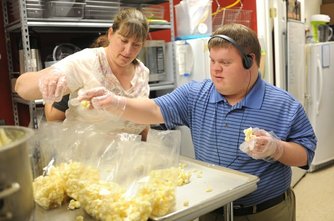 Blake Satterfield is proud to open the door and greet guests at Special Kneads and Treats on the Lawrenceville downtown square. He shows guests to a table and to the gourmet cupcakes on display behind the bakery counter. Blake has Down syndrome and wouldn’t be the first person many businesses would put at their front door. But Blake and others with special needs are the reason why Special Kneads and Treats opened four weeks ago. “From his first day here, he has felt included and productive,” said Blake’s mother, Pat Satterfield. “It’s a wonderful thing for our guys to give back to the community and feel accepted and useful. Once they get the hang of things, when they see a need, they get things done and make people feel welcome.” Special Kneads and Treats at 132 E. Crogan St. is a nonprofit bakery that provides job skills training to special needs adults. It was opened by Tempa Kohler and her husband, Michael, when they purchased the former Sweets on the Square. “We prayed for only provisions and a building and God gave us a bakery with ovens, freezers and an established client base,” Tempa Kohler said. “And now we’re building our own client base. It’s awesome and definitely a God thing.” The Kohlers opened the bakery to help their son Bradley, 24, who was diagnosed with Fragile X Syndrome when he was 7 years old. Fragile X Syndrome is a genetic chromosome disorder that causes mild to severe mental impairment. “Kids with special needs can stay in the Gwinnett School system until they are 22 years old and then they age out,” said Kohler. “We’re here to employ special needs adults and give them a place to come and work and hopefully learn a skill set that they can take to another location.” Kohler is operating the bakery with one employee and five special needs adults who often have family members who stay and help with baking duties. The special needs adults have opened the door and greeted guests, washed dishes, cleaned tables, swept the floor and helped with lettering on cupcake wrappers denoting when they were made. They also help in the kitchen when adequate supervision is in place. Adults with special needs are loyal,” Kohler noted. “They’ll be the first to show up and if you show them a job, they will do it and do it well.” To Read the full article click here: http://www.gwinnettdailypost.com/news/2014/mar/01/lawrenceville-bakery-provides-job-skills-training/ 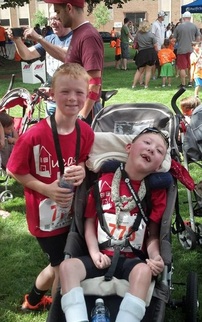 Lucas was born with lissencephaly, a rare brain malformation that only occurs in 85,470 births. It can result in seizures, difficulty swallowing, and other serious problems. When Noah heard about the local YMCA youth triathlon, he told his parents he wanted to take part, but with one very special request—he wanted to take his brother Lucas with him! Noah trained for almost three months before the triathlon began. On the big day, July 12th, he cycled for 3 miles, swam over 200 yards and ran for 1 mile pushing Lucas in a special buggy. "They have an amazing bond. They're best friends and they do everything together" said mom Alissa Aldrich says. "The connection and the love that they share is truly unique." These brothers show us the meaning of love and friendship, and prove that no matter the obtabcles, you can do anything when you put your heart and soul into it. You don’t see incredible acts of love every day, but this 8-year-old shows us it doesn’t take much to make a huge difference in the lives of others. Read more at: http://www.the-open-mind.com/8-year-old-completed-a-triathlon-while-carrying-his-disabled-brother-the-whole-way/#R4IByoYcLyxIzGYv.99 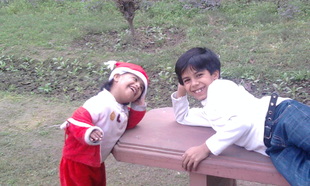 Most of the time the sibling relationship between a ‘typical‘ and a ‘special needs’ child is based on parental or ‘professional’ opinions or perspectives and most of the time, they only present one side of the story. Something that we have always read on nicely written parents’ blogs, i.e. powerful, respectful, uncomplicated and passionate. While the truth is that even if it seems like all ‘sugary with love‘, it cannot remain consistent throughout their growing up years. Those who think otherwise read too much fiction and need a reality check! Think about it, can any relationship be all hunky-dory? Do we really look close enough or scratch the surface a little and have open heart to heart talks with our ‘typical’ children? Do we take it for granted that they are young and do not go through the similar or usual roller coaster ride of emotions that we as parents experience. The Truth?The truth is that a sibling’s role is still the least talked or discussed about, while they remain that one person who is going to share the longest lasting relationship with our child of special needs, more than the parents! We like to believe that as parents we have it hardest, but pay a little attention and you will be surprised to find out that it’s not always compassion, sympathy or love that our ‘normal’ child is experiencing. They too have concerns which are in some ways identical to what we as parents go through like a need for information, guilt, blaming themselves, loneliness, future concerns and in some ways quite different emotions like peer issues, resentment, sibling rivalry and a pressure to perform. It also makes a great difference if the sibling is elder or younger to the child with disability. It is because the younger siblings don’t know any other way of life; he is born into that situation. But in case of older siblings and especially if there is a large gap, they remember the attention, the time they shared alone with the parents. From the Horse’s MouthWhile reading and researching about this issue, I came across a radio show excerpts on ‘Siblings with special needs change childhood’. The show was asking people to share their ‘experiences of having a brother or a sister with special needs’. I was all ready to hear some nice emotional sentiments and touching stories of how that experience changed the lives of these callers and how they were eternally thankful for having the brothers or sisters they had, but I had the reality biting me in few seconds when I heard the reactions of a Girl with a special needs brother. In her own words, ‘you know, as we grew up, I can relate too to being kind of ashamed of my brother but also kind of missing out on a brother-sister relationship like my friends had. And that was difficult too. You know, and a lot of attention does go to the child. I can remember coming home from school a lot of times, and my Mom, you know, was somewhere with my brother for some sort of an appointment, and this went on and on for like a couple of school years this way” I almost felt wet in my eyes. Was it my story? Was I giving too much attention to my daughter with Down syndrome? I started listening again to be sure if that call was just an exception, but there were more calls to follow. To Keep reading click the link below: http://www.twominuteparenting.com/5-things-to-make-sure-your-sibling-is/ 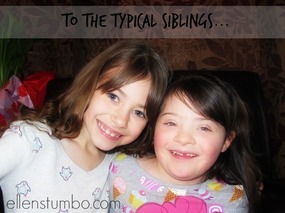 I know you’ve had to sacrifice so much, and I wish you hadn’t. For the many times you’ve thought it wasn’t fair, we’ve felt it too. And if you’ve had to miss out on life experiences, please know that we wish we could offer you the world. Perhaps at times you’ve felt overlooked, because your sibling’s needs demand all of your parents’ attention. But they see you, they see you in the cracks of their vision, and their hearts hurt for the moments they’ve had to sacrifice time with you. But many nights they think about you, of the wonderful person that you are. I want you to know that the pride and love they feel for you could never be measured, you are what keeps them going many times. You make their days brilliantly beautiful. And you’ve told us – your sibling with a disability has affected you too. Yes, there’s been sacrifices and some things you’ve had to give up, but you’ve gained so much from your sibling too. You’ve said your siblings with disabilities have shaped you into who you are today. We look at you, and we’re sure there is not a more compassionate, caring, accepting, and kind human being walking on this earth. We’ve seen you be frustrated with your sibling, because after all you are siblings. We’ve seen the frustration in your eyes. But then something happens – perhaps it is a look that as parents we don’t recognize – but we see that frustration be replaced with love. You can be annoyed by hands pulling at you, and suddenly be a willing participant in the biggest, sweetest embrace that any siblings could ever share. I see the love in your eyes for your sibling, and I cannot believe that the two of you can share this kind of love. It’s not typical, but it runs so deep, and it reflects a quiet strength in you that brings me to tears. We’ve seen you stand up to the bullies, even when it was scary. Because you understand so deeply that it isn’t right to diminish anyone, in any way. And you have extended not only a smile, but a friendship to the kids that others so easily overlook. Because you don’t, you don’t ever overlook people. You notice them, you affirm them. With your smile and friendship you remind them that they matter in this world too. You are perhaps more mature than someone your age. You’ve probably had more responsibilities than most of your peers. I guess in some ways you’ve lived a different life, life impacted by disability. And every day you’re out there, moving in this world with an understanding about the beauty and value of life that makes you stand out, and understanding that few people posses. You’ve known these truths from a young age, they’ve always been a part of your life. As the parents, we arrived to those truths much later in life. And you smile at life, enjoying every moment. You are stirring the people around you, helping them to see what you see, to know what you know. You are affecting people’s perceptions of disability as you advocate for your sibling, as you give them a voice when needed. You have willingly embraced this role…it humbles me, it brings me to tears. You are moving those around you, and you will continue to do so. As parents, we hope to make this place a better place for our kids. But as the siblings – with hearts so full of acceptance, compassion, an understanding of the value of life – you will go out into this world and change it. Not just for your siblings, but for all of us. Thank you! If you ever wonder who we look up to, it’s you. We could not be prouder or love you more fiercely. Originally posted by: http://www.ellenstumbo.com/typical-siblings/ 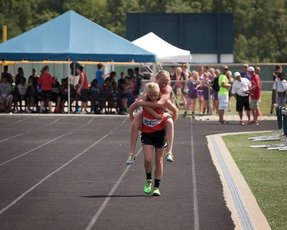 Twin sisters Chloe and Claire Gruenke might have come in last place in their recent track race, but they deserve a medal anyway for the inspiring way they made it across the finish line. The 13-year-old girls, both eighth-graders from Trenton, Illinois, were competing in the 800-meter race at the Southern Illinois State track meet on May 10, when Chloe took a tumble, according to KTVI, a local news affiliate in nearby St. Louis. “I felt something pull and pop in my thigh and then around the first curve on the second lap it just hurt too bad and I couldn’t go anymore so I just fell to the ground,” she explained in an interview with the station. But she didn’t stay there long. Instead, Claire pulled her sister on to her back and carried the injured twin for the remaining 370 meters all the way to the finish line. Twins have a special bond, of course, but Claire simply says her motivation for the move was “love and sportsmanship.” Piggybacking a human of equal size and weight isn’t easy, but she credits the roaring crowd for the surge of energy she got. Of those supporters cheering in the crowd was the girls' father, Doug Gruenke. He tells Yahoo Shine that he knew that Claire wouldn’t leave her sister, and her actions didn’t surprise him, but he didn’t know if she would be able to carry Chloe the whole lap around the track to the finish line. Coree Waltering, one of the twins’ coaches at Wesclin Junior High School, calls the good deed a “happy coach moment.” Another coach, Ted Crail, is thankful he happened to be wearing sunglasses because there were definitely tears in his eyes. To Read more click here: https://shine.yahoo.com/parenting/twin-carries-injured-sister-across-the-finish-line-160401450.html_ 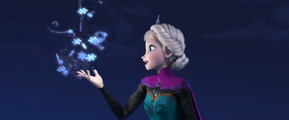 My kids are only 2, so I'm still not fully in the loop of kid-culture. Frozen largely stayed off my radar during its run in theaters, because I am NOT crazy enough to take these two to a movie in a theater yet, and I didn't even see trailers because we don't have cable and they don't show ads for movies on Hulu very often. I'd see posts in my social media feeds from moms of older kids complaining about watching it for the umpteenth time, or having the songs stuck in their heads, and I even saw a few videos shared that related to the film, like those self-declared good-looking parents lip-synching. (Tip: unless you're Derek Zoolander, never talk about how good-looking you are.) All that said, the other day we bought Frozen and tried to watch it as a family. The girls had had a long, late nap that day, so we were looking for a low-key evening activity. And I'd been kind of curious about a movie I heard was about two sisters -- I have a sister and am raising a pair of sisters and YAY SISTERHOOD, you know? I popped popcorn, and all four of us snuggled on the couch and we pressed play. Elmo? the girls asked. And kept asking. Basically, through the entire movie they wanted to know where the heck Elmo was, and if Elmo wasn't in this movie, why were we watching it at all? We didn't even finish before putting them to bed. To read more: http://www.huffingtonpost.com/sarah-sweatt-orsborn/watching-frozen-with-my-daughters_b_5105525.html 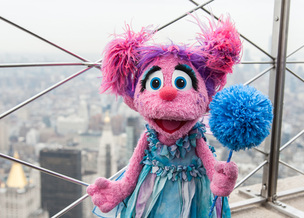 The nonprofit behind Big Bird, Elmo and Abby Cadabby is launching a new effort to reduce stigma surrounding kids with autism and help those with the developmental disorder learn life skills. Through a new initiative dubbed “See Amazing in All Children,” Sesame Workshop said it will create digital tools to help children with autism learn to play with others and complete everyday activities like brushing teeth, getting dressed and trying new foods. In addition, the organization said it will use Sesame Street’s brand and characters to educate the public about autism and emphasize that kids on the spectrum are much like their typically developing peers. “This has become one of the most widely-discussed topics in childhood development, yet we have found that there’s a lack of understanding among the general public about children with autism,” said Jeanette Betancourt, Sesame Workshop’s senior vice president for community and family engagement. “Sesame Workshop has a long history of addressing diversity, acceptance and inclusion, and we felt we could play a critical role in reducing misconceptions by highlighting the commonalities children with autism share with all children.” Beyond its efforts aimed at children, Sesame Workshop said it also plans to work with Exceptional Minds, a Sherman Oaks, Calif. vocational center that teaches young adults with autism computer animation and post-production skills, to help create content. http://www.disabilityscoop.com/2014/04/04/sesame-street-autism/19257/ 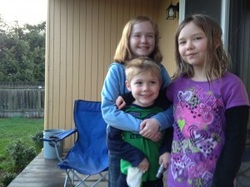 There is so much to say to you all, you fierce soldiers of breakthrough. You grow up in the same house as one they call “special,” and that carries more weight than we understand. It means that your parents’ eyes look past you. That we take it for granted that you are whole even when you are not. It means that you give and give and give. Every big sister shares with her siblings, but most of them don’t give away their entire portion. You do it. Often. You watched your brother grow bigger but not older. We had that talk, introducing you to that mysterious word, “autism,” but you already knew something was wrong. When did you figure it out? Was it when you saw other boys trying to play with him? Or when he threw himself on the floor and screamed in the lobby of the bank? I hope it was something like that, and not something we, your parents, did. Because I’m sure you saw the change in us, too. We traded in our laughter for dark clouds and chronic busyness—not just from the doctors’ appointments, but from the other appointments, too. The ones that took our joy and concentration even when we sat next to you on the sofa. To read more click here: http://www.jasonhague.com/2013/02/25/a-salute-to-the-siblings-of-autism/ 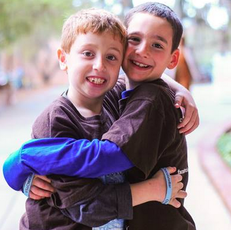 Dylan Siegel, 7, would do anything for a friend -- especially if that friend is his best one, 8-year-old Jonah Pournazarian. The pair has been inseparable ever since they met in preschool, when Dylan learned that Jonah faces a rare battle their other classmates didn't -- glycogen storage disease, or GSD, according to LEX 18. The condition causes Jonah's blood sugar to drop to potentially fatal levels, forcing his parents to follow an inflexible, round-the-clock schedule of feeding Jonah through a stomach tube in order to keep his metabolism stable, according to ABC News. GSD does not have a cure. And, to Dylan, that is unacceptable. So, back in 2013, when he was 6 years old, Dylan wrote a book to help his friend and others struggling with the disease. But, it's not your typical page-turner, every penny from sales of "Chocolate Bar" -- a term used by Dylan to mean "awesome" -- goes directly to a lab at the University of Florida College of Medicine in Gainesville, Fla., which is working on a cure for the disease. "It is now reality. It's not just a dream that these children can be cured," Dr. David Weinstein, who runs the University of Florida lab, told Fox 17. To date, Dylan has raised more than $750,000 in the fight against GSD. Before the money began pouring in from book sales, funding for Weinstein's research was falling flat, ABC News reported. "Chocolate Bar" has given those suffering from GSD renewed hope for a better tomorrow. To read more: http://www.huffingtonpost.com/2014/03/12/boy-writes-book-for-charity_n_4949967.html?icid=maing-grid7%7Cmain5%7Cdl28%7Csec1_lnk2%26pLid%3D453593 Please visit website Dylan and Jonah's website: http://chocolatebarbook.com/ |
AuthorRebecca is an independent publisher working to help siblings of children with emotional challenges. Archives
April 2017
Categories
All
|
My Big Brother Bobby: A Story to Help Kids Understand Angry Feelings and Behaviors in Others
 RSS Feed
RSS Feed
